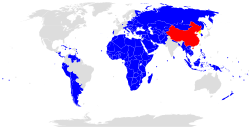This article may incorporate text from a large language model .(September 2025) |
The Regional Comprehensive Economic Corridor (RCEC) is a bilateral economic development initiative between Indonesia and China, formally established in 2018 as part of China's Belt and Road Initiative (BRI). The corridor encompasses four Indonesian regions: North Sumatra, North Kalimantan, North Sulawesi, and Bali, collectively referred to as "3 North + 1 island." [1]
The RCEC was conceived during the presidency of Joko Widodo (2014-2024) as part of his Global Maritime Fulcrum policy. In May 2018, Indonesian Coordinating Minister for Maritime Affairs Luhut Binsar Pandjaitan signed a memorandum of understanding with Chinese counterparts at the National Development and Reform Commission of China. The plan received approval at the 2019 Belt and Road Forum. [1]
While RCEC projects have faced challenges, Chinese capital has been redirected toward Indonesia's nickel industry in regions outside the corridor, particularly Central Sulawesi and North Maluku. The Indonesia Morowali Industrial Park alone has received over US$34.3 billion in loans from Chinese state-controlled banks, representing a shift toward critical mineral processing rather than the original corridor vision. [1] This redirection illustrates what researchers describe as "uneven and combined development," where capital flows respond to global market pressures and strategic priorities rather than planned corridor frameworks. [1]
